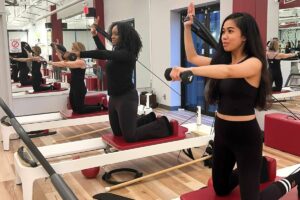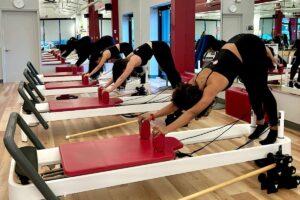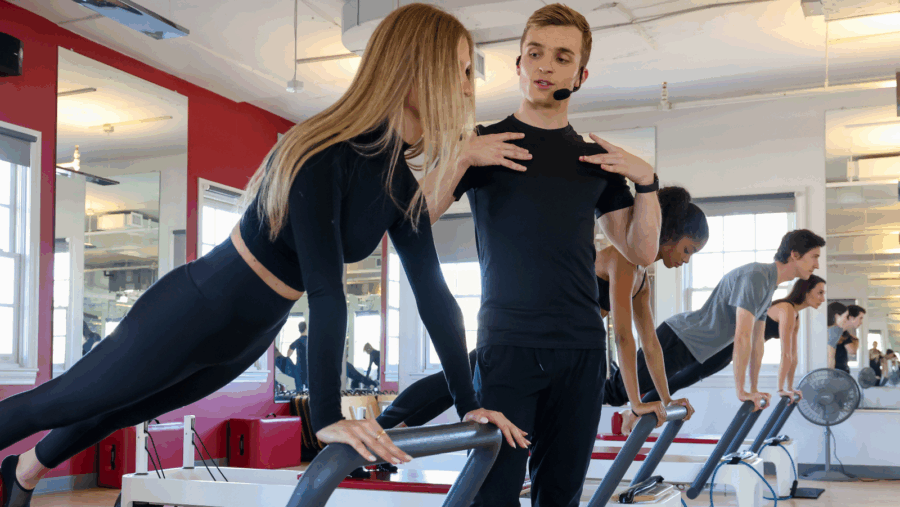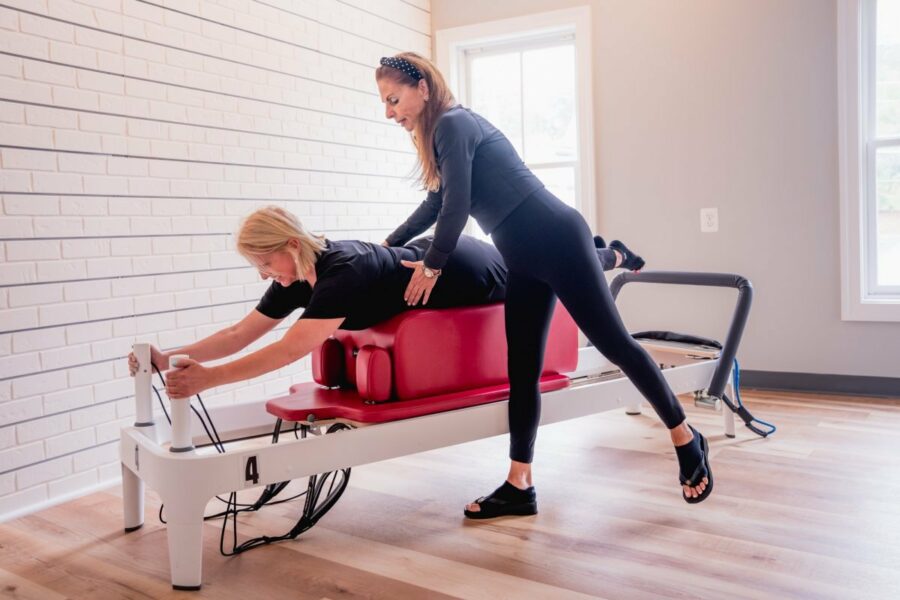 With all of the options available for health and exercise, it can be difficult to choose. Reformer Pilates is an effective and popular method of gaining strength, but many people are unsure whether it is a good fit for them because they struggle with flexibility.
With all of the options available for health and exercise, it can be difficult to choose. Reformer Pilates is an effective and popular method of gaining strength, but many people are unsure whether it is a good fit for them because they struggle with flexibility.
Because they see Pilates participants doing deep stretches on the machine, they assume that they need to be flexible before starting. Thankfully, this is not true!
The reformer machine assists people of all ability levels. As an added benefit, doing Pilates is a great way to improve your flexibility, so even if you begin your training a bit stiff, you can see progress over time.
Here’s why Reformer Pilates is not just for flexible people and why you should give it a try, especially if you are not very flexible.
Doesn’t Pilates Require Flexibility?
Pilates is a method of exercise that engages and targets the entire body, encouraging a wider range of motion and the gradual establishment of strength, stability, and balance.
This means that people do not need to start with these elements already established! As Pilates instructors, we are so excited to watch our participants make gains in these areas as they learn and gain skills over time.
If you are starting Pilates from a baseline of minimal flexibility or even stiffness, understand that the combination of attentive guidance from instructors and the reformer machine itself work together to set you up for success.
Those who practice Pilates regularly often see an increase in their flexibility which can help them live a better, more mobile and enriching life.
How the Reformer Helps to Build Flexibility
 A reformer Pilates machine is a keystone in helping to increase flexibility in Pilates participants. The reformer can adapt to each person’s unique needs, supporting or challenging them in the areas that matter most.
A reformer Pilates machine is a keystone in helping to increase flexibility in Pilates participants. The reformer can adapt to each person’s unique needs, supporting or challenging them in the areas that matter most.
The springs on a reformer are adjustable, allowing participants to gradually increase their range of motion slowly and consistently. Coupling this with changes in tension and resistance, Pilates practitioners can target muscle and ligament groups without straining them, leading to gradual flexibility gains in a safe manner.
Another secret behind reformers and flexibility is consistency. Unlike free stretching, using a reformer creates a consistent stretch each time, allowing for a more controlled increase in flexibility that reduces the chances of injury and overstretching.
Functional vs. Performative Flexibility
With all this talk of how Reformer Pilates can improve a person’s flexibility, even if they start from a benchmark of relative stiffness, people often wonder— does it really matter? In reality, being flexible is just as important as being strong.
The term “functional flexibility” refers to being flexible enough to perform the daily tasks that you want or need to do in order to live a happy and successful life for the long term.
Some people take for granted the ability to simply reach into a cabinet above their heads or lift their leg sideways to step over an obstacle.
Reformer Pilates develops functional flexibility (another term for general mobility) because it replicates natural, useful motions in a holistic manner.
Using a reformer can train the entire body, and especially the core, which is essential for stability. Those who practice Pilates frequently tend to be able to get the most out of their daily activities without pain and injury.
Notably, there is a difference between functional flexibility and performative flexibility. Imagine a ballerina, whose flexible body allows her to easily slip into a split or hold her leg above her head.
This type of flexibility is developed in pursuit of a specific task—in this case, being a ballerina. Reformer Pilates can help develop a baseline of flexibility, but if you need to be at a certain level of flexibility for work or a hobby, this can take additional and more specialized training.
 The good news is that Reformer Pilates can help here, too! Because the reformer machine is adjustable, even those who are targeting specific types of flexibility can leverage the consistency and assistance of the reformer to develop the abilities they want and need in order to live their best lives.
The good news is that Reformer Pilates can help here, too! Because the reformer machine is adjustable, even those who are targeting specific types of flexibility can leverage the consistency and assistance of the reformer to develop the abilities they want and need in order to live their best lives.
Try Reformer Pilates to Gain Strength and Flexibility
If you are hesitant to start Reformer Pilates classes because you are not very flexible, don’t let that idea stop you! Doing Pilates on a reformer can significantly increase your flexibility.
The instructors at RTR Pilates are happy to help you unleash your body’s abilities and grow your flexibility as you develop your skills in Pilates classes. Contact RTR Pilates to sign up for a class to improve your body’s strength, resilience, flexibility, and balance.



